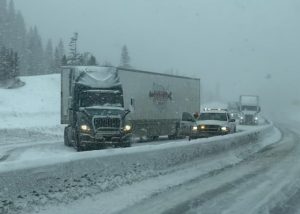Lawmakers, insurance industry reach consensus on bill aiming to regulate Colorado homeowners’ wildfire risk, premiums
Homeowners will now be held to an industry-recognized standard for mitigation work that could reduce their costs, among other changes

Jason Connolly/Summit Daily News archive
Colorado lawmakers have reached a consensus with insurance industry representatives over a bill that seeks to regulate how carriers determine a homeowner’s wildfire risk and the premiums they pay.
House Bill 1182 passed the Senate on Friday after being approved in the House last month. The bill is now poised to head to Gov. Jared Polis’ desk.
Polis has mentioned tackling the rising cost of homeowners insurance as a top legislative priority, calling for lawmakers to pass reform measures in his State of the State address.
In an interview following a meeting with insurance industry leaders in December, Polis said insurers need to do more to reward homeowners who take mitigation seriously.
“Of course, we know that there are solutions, like hail-resistant roofs, like community-level and home-level risk mitigation,” Polis said. “What’s frustrating is spending money here and there while homeowners insurance continues to go up. That has to end.”

Support Local Journalism
Colorado has seen a dramatic increase in insurance costs in recent years as weather events, intensified by climate change, drive up homeowners’ risk.
According to a study by the state-run Division of Insurance, premiums for single-family homes jumped 52% between January 2019 and October 2022. In the High Country, where wildfire is an even more present threat, some homeowners have reported premium increases upward of 1,000%.
At the heart of House Bill 1182 is an effort to give homeowners more credit for steps they take to protect their homes and reduce their risk.
“People are doing different kinds of mitigation work thinking that the insurance company will be impressed and give them a discount,” said Rep. Brianna Titione, D-Arvada, during debate on the House floor last month, “and a lot of times what they’re doing is irrelevant to what the insurance company thinks is best for the property.”
Under the bill, insurance carriers would be required to consider mitigation efforts when assessing a homeowner’s wildfire risk. Companies would also need to share information on their risk models with the state’s insurance division, explain to homeowners how their risk is calculated and what they can do to lower it, and allow homeowners to appeal their risk score.
Titione, a bill sponsor, said the measure “is about promoting transparency and accountability in the wildfire risk scoring and the models and empowering Coloradans to make informed decisions about mitigation.”
Bill sponsors agreed to several amendments brought forward by the insurance industry.
That includes holding homeowners’ mitigation efforts to an industry-recognized standard, such as the Insurance Institute for Business and Home Safety’s Wildfire Prepared Home program.
The program certifies homes that meet a set of criteria as being “wildlife-resilient” and is currently recognized by insurance carriers in California and Oregon as a way to lower premiums.
Carole Walker, executive director for the Rocky Mountain Insurance Association, said that having standards for mitigation work in House Bill 1182 could open the door to having the program recognized by insurers in Colorado.
“We all believe in mitigation, but just mowing the grass is not enough,” Walker said. “What we’ve found is there needs to be actionable mitigation that people are doing, and this helps us verify it, and once it’s verified, that’s something that the models can consider.”
Other amendments allow insurance companies to directly lower a homeowner’s premium rather than adjusting their models to account for new mitigation work. Walker said this gives carriers more flexibility to adhere to the bill since not all models work the same.
The bill also narrows what information must be shared between carriers and the state when it comes to modeling software and ensures that a company’s intellectual property is kept confidential. Changes were also made to exempt nonresidential commercial properties from the bill and to push out the bill’s implementation date from January to July 2026.
Walker stressed to lawmakers to be mindful of not passing policies that would drive insurers out of the state due to overregulation. She said the bill’s amendments “come to what I think is a good opportunity for education around what the models do and meaningful mitigation steps that are verifiable.”
House Bill 1182 received broad bipartisan appeal, passing the House by a vote of 45-18 and the Senate by 33-1. House lawmakers must still approve changes made in the Senate before the bill can go to Polis’ desk.











